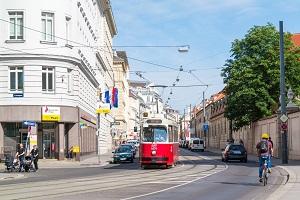Decarbonizing transport and mobility remains a critical policy challenge, for which we must seize the recovery from the COVID-19 pandemic as a unique opportunity to accelerate progress. Decarbonization is one example of an issue where transport, health, and environment all meet – an intersection which has been the focus of two decades of multilateral negotiation and cooperation under the Transport, Health and Environment Pan-European Programme (THE PEP).
The Fifth High-level Meeting on Transport, Health and Environment will convene online from 17-18 May 2021, hosted jointly by two Austrian ministries – the Federal Ministry for Climate Action, Environment, Energy, Mobility, Innovation and Technology; and the Federal Ministry for Social Affairs, Health, Care and Consumer Protection. The High-level Meeting serves as the governing body of THE PEP, a unique platform jointly serviced by the UNECE and the WHO Regional Office for Europe.
The meeting is expected to result in the Vienna Declaration, which is the culmination of several years of work to increase cross-sectoral coordination and policymaking regarding sustainable transport in the pan-European region. Recognizing the critical decade ahead, the text of the Vienna Declaration addresses major challenges including air pollution, GHG emissions, and traffic noise.
As signatories to the Vienna Declaration, member States will also call for intensified involvement in THE PEP as an effective contribution to implementing the Paris Agreement. Indeed, despite some improvements in efficiency and a move towards greater electrification of transport, transportation accounts for approximately 25% of carbon dioxide (CO2) emissions from fuel combustion each year.
Paving the way for healthy and active mobility is another key part of the Vienna Declaration; UNECE member States will set several objectives for 2030, such as improving infrastructure, safety, and numbers of participants in active mobility. Cycling contributes to sustainable and healthy lifestyles and societies in numerous ways. It creates jobs, from the manufacturing process to cycling-related research, and contributes to tourism and the rural and local economy. Cycling also has a positive effect on health by promoting physical activity and active lifestyles, ultimately reducing mortality rates and the costs of health care.
Through the Vienna Declaration, Governments will adopt the first Pan-European Master Plan for Cycling Promotion – a systematic plan to help national and local stakeholders streamline efforts to promote cycling. An additional set of recommendations has been formulated in response to the COVID-19 pandemic to highlight the role that active mobility can play during times of crisis.
Not all problems can be solved by promoting active mobility alone. Eco-driving provides a smarter, safer, and more sustainable way of driving through reduced fuel consumption and improved efficiency. It can help tackle CO2 emissions, noise pollution, and traffic congestion, as well as facilitate the achievement of other important objectives, including: improved traffic safety; reduced driving stress and greater comfort for drivers; lower fuel consumption and operating costs; and lower health risks. In this regard, the Policy Recommendations for Eco-Driving, another output of the Vienna Declaration, provide ten core implementation steps for member States.
Half of the world’s population lives in cities, which account for 95% of carbon emissions through their transport and the energy sectors. Given the inevitable increase in urbanization and urban mobility needs, it is critical that we pursue sustainability. From 2019, THE PEP raised its ambition and recognized the impact that sustainable urban mobility can have in achieving the 2030 Agenda and the Paris Agreement. Key conclusions and recommendations drawing on the Handbook on Sustainable Urban Mobility and Spatial Planning: Promoting Active Mobility will also form part of the Vienna Declaration and will be presented at the High-Level Meeting.
The Meeting will also address a set of recommendations related to new transport challenges created by the pandemic. The recommendations strive to make post-pandemic mobility more environmentally sound, healthy, resilient, and sustainable through THE PEP.
Through the adoption of the Vienna Declaration and its annexes, member States will commit to continue working together to address transport, health, and environmental challenges and to strengthen their efforts in the critical decade ahead.
However, the Meeting is not limited to these two days. A full spectrum of side events, a total of 24 in the form of webinars, will take place from 10 to 12 May. The cross-cutting subjects will cover: the promotion of walking and cycling, the promotion of sustainable and safe transport through different angles (such as eco-driving, speed limitation, spatial planning, tourism), the promotion of mobility for health and finally the inclusion of a social dimension, with a special attention to youth and women.
Conscious policies and raising awareness of disparities in transport, health and environment are key to achieve a sustainable future. It is in this perspective that gender mainstreaming will be discussed in a special dedicated side event/webinar taking place on 10 May, from 12:30PM to 1:45PM. This is a particularly significant event as it will mark the beginning of THE PEP’s work on gender mainstreaming. The webinar will be opened by the Executive Secretary of the UNECE, Ms. Olga Algayerova.
The above text is adapted from a guest article originally published by IISD: https://sdg.iisd.org/commentary/guest-articles/moving-forward-to-clean-safe-healthy-and-inclusive-mobility-in-the-pan-european-region/


